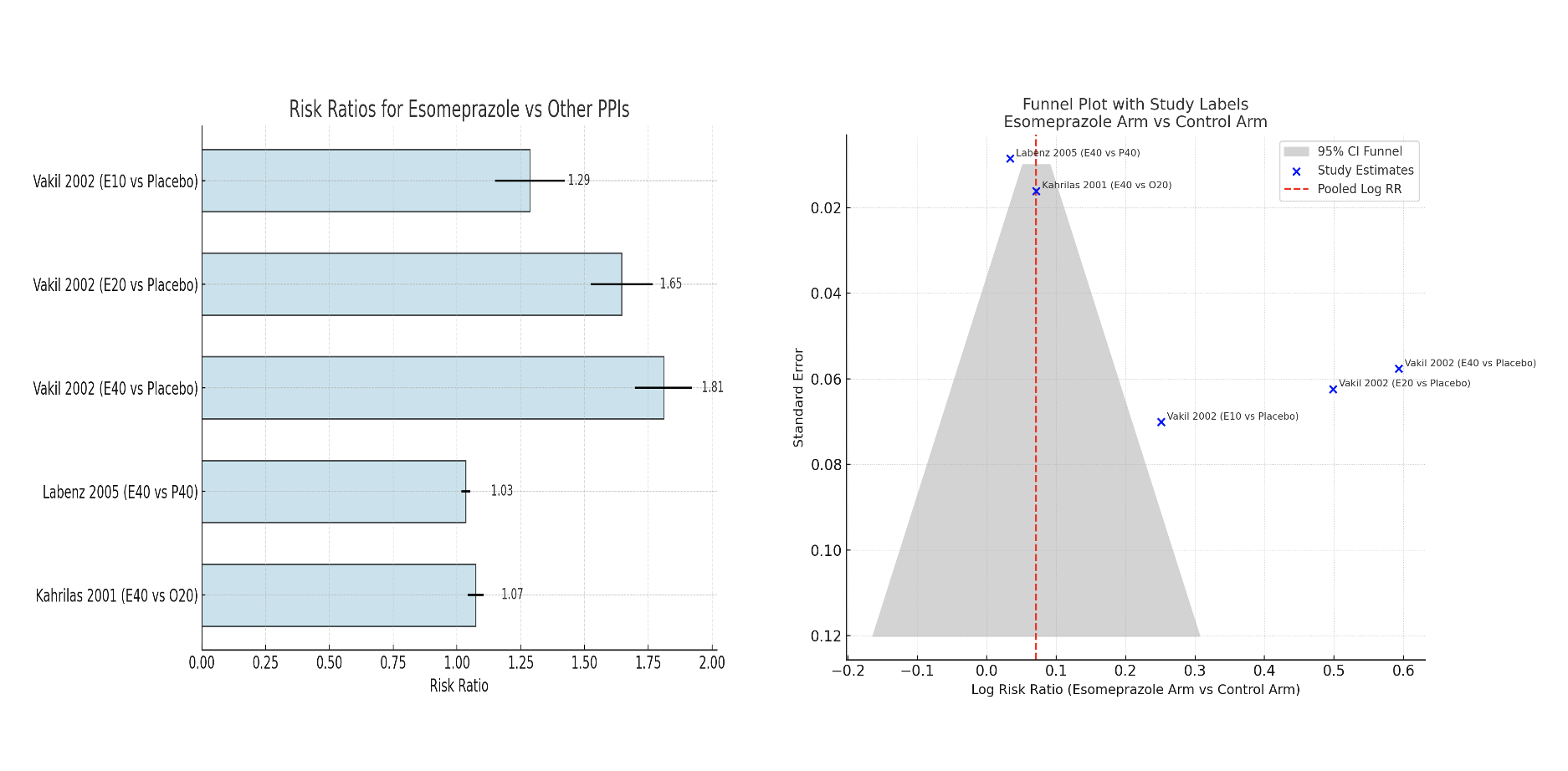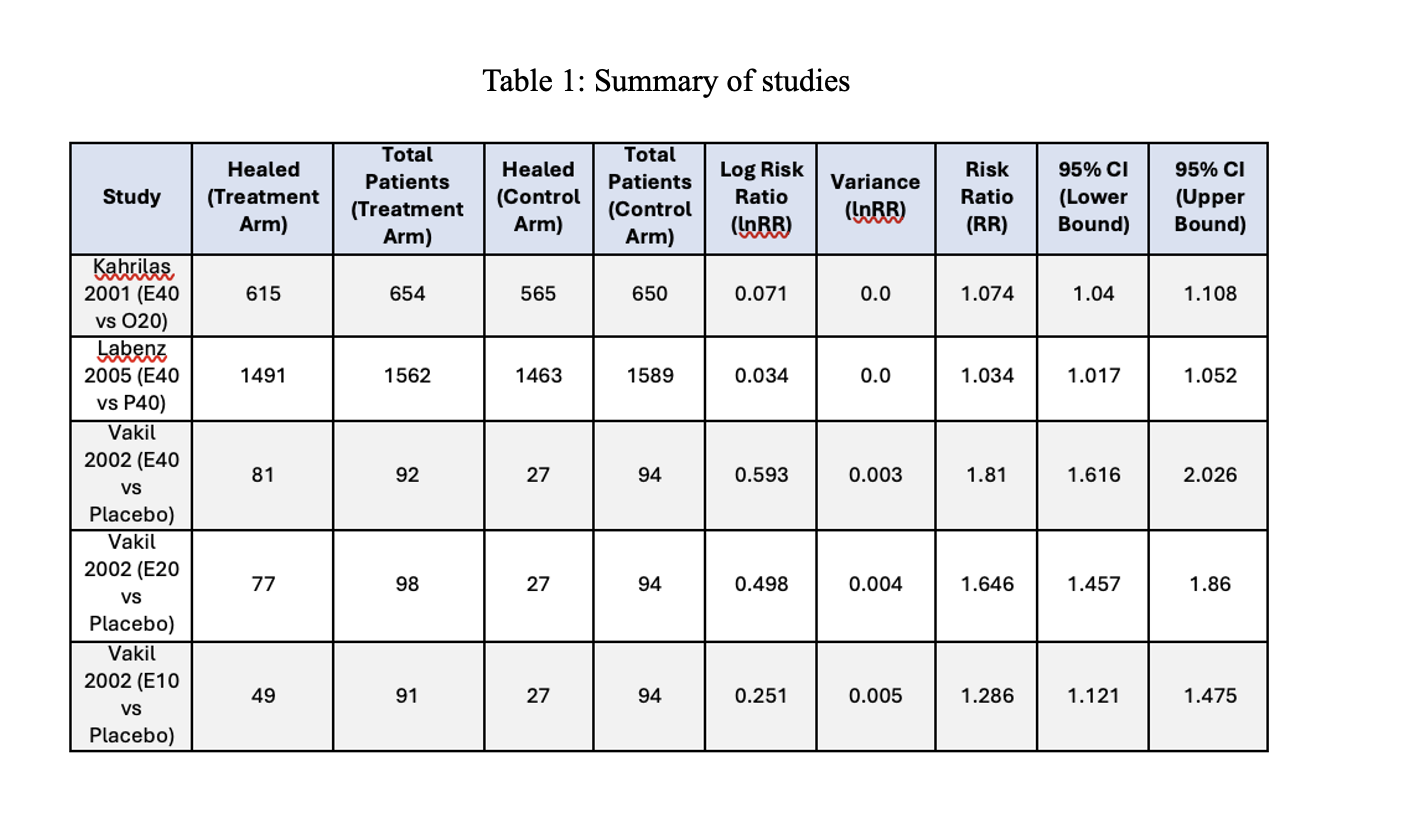Sunday Poster Session
Category: Esophagus
P0596 - Efficacy of Esomeprazole for Healing and Maintenance of Erosive Esophagitis: A Meta-Analysis of Randomized Controlled Trials
Sunday, October 26, 2025
3:30 PM - 7:00 PM PDT
Location: Exhibit Hall
- RU
Rafat Uddin, MS
SUNY Downstate Health Sciences University
Brooklyn, NY
Presenting Author(s)
Anwar Uddin, MD, Madia Ahad, MD, Rafat Uddin, MS, Aregawi Bihon, MD, Savanna Thor, DO, MPH
SUNY Downstate Health Sciences University, Brooklyn, NY
Introduction: This meta-analysis evaluates the efficacy of esomeprazole in both induction and maintenance of healing in erosive esophagitis (EE) using data from randomized controlled trials. EE, a GERD subtype, involves visible esophageal mucosal injury. While prior meta-analyses assessed PPIs as a class, few focused exclusively on esomeprazole across both phases. This study consolidates esomeprazole-specific RCT data, providing a focused analysis across comparators, dosages, and treatment durations
Methods:
This meta-analysis included five treatment-control comparisons from three RCTs evaluating esomeprazole (40 mg, 20 mg, 10 mg) for healing or maintenance of erosive esophagitis. Controls included omeprazole, pantoprazole, or placebo. Primary outcome was endoscopic healing at 4–8 weeks or maintenance at 6 months. Log risk ratios (lnRR) and variances were calculated. A DerSimonian-Laird random-effects model was used. Heterogeneity was assessed using Q, I², and τ². Funnel plots were used to assess publication bias.
Results: The meta-analysis included five comparisons with 3,885 patients. Esomeprazole showed a pooled RR of 1.074 (95% CI: 1.040–1.108; p < 0.0001) compared to controls, with each trial reporting higher healing or maintenance rates in the esomeprazole arm. Heterogeneity was high (Q = 152.13, df = 4; p < 0.0001; I² = 97.37%; τ² = 0.0205), likely due to differences in dosing, comparators (omeprazole, pantoprazole, placebo), and timing of outcome assessments. Funnel plot asymmetry suggested possible small-study effects, though interpretation is limited by the small number of studies. By consolidating RCTs focused solely on esomeprazole across both treatment phases, this analysis provides a clearer assessment of its efficacy, demonstrating a consistent and statistically significant benefit despite inter-study variability.
Discussion: This meta-analysis found that esomeprazole was associated with a statistically significant increase in healing and maintenance rates in erosive esophagitis across randomized controlled trials. Observed variability between studies warrants consideration in future comparative trials using standardized methodologies.

Figure: Table 1: Summary of Studies

Figure: Figure 1 and 2: Risk Ratio Bar chart and Funnel Plot
Disclosures:
Anwar Uddin indicated no relevant financial relationships.
Madia Ahad indicated no relevant financial relationships.
Rafat Uddin indicated no relevant financial relationships.
Aregawi Bihon indicated no relevant financial relationships.
Savanna Thor indicated no relevant financial relationships.
Anwar Uddin, MD, Madia Ahad, MD, Rafat Uddin, MS, Aregawi Bihon, MD, Savanna Thor, DO, MPH. P0596 - Efficacy of Esomeprazole for Healing and Maintenance of Erosive Esophagitis: A Meta-Analysis of Randomized Controlled Trials, ACG 2025 Annual Scientific Meeting Abstracts. Phoenix, AZ: American College of Gastroenterology.
SUNY Downstate Health Sciences University, Brooklyn, NY
Introduction: This meta-analysis evaluates the efficacy of esomeprazole in both induction and maintenance of healing in erosive esophagitis (EE) using data from randomized controlled trials. EE, a GERD subtype, involves visible esophageal mucosal injury. While prior meta-analyses assessed PPIs as a class, few focused exclusively on esomeprazole across both phases. This study consolidates esomeprazole-specific RCT data, providing a focused analysis across comparators, dosages, and treatment durations
Methods:
This meta-analysis included five treatment-control comparisons from three RCTs evaluating esomeprazole (40 mg, 20 mg, 10 mg) for healing or maintenance of erosive esophagitis. Controls included omeprazole, pantoprazole, or placebo. Primary outcome was endoscopic healing at 4–8 weeks or maintenance at 6 months. Log risk ratios (lnRR) and variances were calculated. A DerSimonian-Laird random-effects model was used. Heterogeneity was assessed using Q, I², and τ². Funnel plots were used to assess publication bias.
Results: The meta-analysis included five comparisons with 3,885 patients. Esomeprazole showed a pooled RR of 1.074 (95% CI: 1.040–1.108; p < 0.0001) compared to controls, with each trial reporting higher healing or maintenance rates in the esomeprazole arm. Heterogeneity was high (Q = 152.13, df = 4; p < 0.0001; I² = 97.37%; τ² = 0.0205), likely due to differences in dosing, comparators (omeprazole, pantoprazole, placebo), and timing of outcome assessments. Funnel plot asymmetry suggested possible small-study effects, though interpretation is limited by the small number of studies. By consolidating RCTs focused solely on esomeprazole across both treatment phases, this analysis provides a clearer assessment of its efficacy, demonstrating a consistent and statistically significant benefit despite inter-study variability.
Discussion: This meta-analysis found that esomeprazole was associated with a statistically significant increase in healing and maintenance rates in erosive esophagitis across randomized controlled trials. Observed variability between studies warrants consideration in future comparative trials using standardized methodologies.

Figure: Table 1: Summary of Studies

Figure: Figure 1 and 2: Risk Ratio Bar chart and Funnel Plot
Disclosures:
Anwar Uddin indicated no relevant financial relationships.
Madia Ahad indicated no relevant financial relationships.
Rafat Uddin indicated no relevant financial relationships.
Aregawi Bihon indicated no relevant financial relationships.
Savanna Thor indicated no relevant financial relationships.
Anwar Uddin, MD, Madia Ahad, MD, Rafat Uddin, MS, Aregawi Bihon, MD, Savanna Thor, DO, MPH. P0596 - Efficacy of Esomeprazole for Healing and Maintenance of Erosive Esophagitis: A Meta-Analysis of Randomized Controlled Trials, ACG 2025 Annual Scientific Meeting Abstracts. Phoenix, AZ: American College of Gastroenterology.
